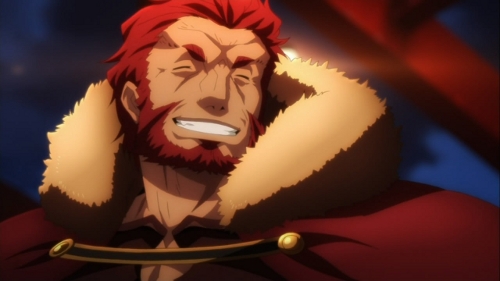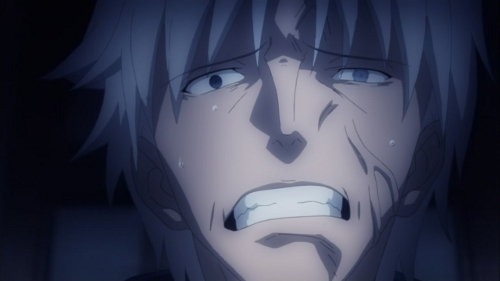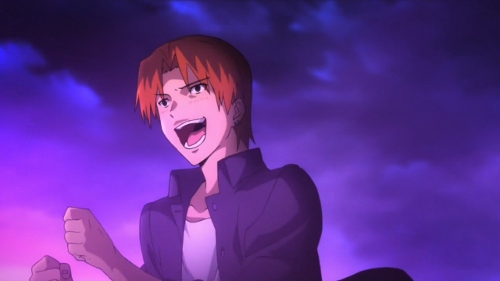
While I’ve read several works in literature that could pass as nihilistic, it wasn’t until Fate/Zero I could say I’ve come across a truly nihilistic masterpiece. Even the classic Neon Genesis Evangelion did not reach this nadir of such depraved nihility. Gen Urobuchi, the writer of Fate/Zero has expressed similar sentiments in his other works such as Puella Magi Madoka Magica, but Fate/Zero serves as a platform that displays a potpourri of various philosophies that are exposed one by one as fictitious or illusory.
The final episode aired last Saturday, and I finished the original light novel a few days ago. The following are my reflections of the material. Below lurk spoilers. Venture at your own risk!
The entire thrust of the series can be summed up by the following quote by Sartre:
The history of a life, whatever it may be, is a history of failure. (Being and Nothingness, p. 619)
For each major character that represents a certain ideal or a philosophical approach, Fate/Zero demonstrates the futility of ideals in which their consequences are necessarily failures.
Kiritsugu and consequentialism

As the major protagonist, Kiritsugu believed in sacrificing anything and everything for the greatest good. Whether it was his father, or his mentor, or even his own wife, the only that mattered was his deep-seated desire for an abstraction — the end of all war, all conflict — the final redemption of all humanity. This accounts for Kiritsugu’s participation in the Holy Grail war, but the corrupt Grail itself exposed Kiritsugu’s utilitarian methods to be self-defeating, because it must be consistently applied until nobody is left alive – except for the utilitarian judge himself. In the end, Kiritsugu emerges from the wreckage as a broken man.
Kirei and joy of pain
The presumptive villain Kotomine Kirei was initially a loyal, selfless priest who did not truly know himself until the perceptive servant Archer tempted him with the forbidden fruit of joy – the pure, unadulterated joy of others’ pain. Kirei undertook an odyssey of self-discovery that ends in sadism — clearly a parody of the cliched moment of enlightenment in other optimistic stories.
Saber and duty
The tragic heroine Saber is a noble character who upheld the code of chivalry, but this very code drove her most loyal knights, allies and country to complete destruction. She desires to undo history and reset it before the Roman Britons lost to the Anglo-Saxons. Her master Kuritsugi orders her, against her wishes, to destroy the Holy Grail, and she returns to the moment of her failure — atop a mound of bodies slaughtered during a battle — a Pyrrhic victory that cost everyone’s lives.
Lancer and fatalism
The servant Lancer, during his mortal lifetime, failed his duty by falling in love with the betrothed of his master. As a heroic spirit, Lancer desires nothing but the redemption of his honor – to serve his new master. But the fates are cruel by repeating history, and Lancer fails again, due to a curse that forces women to fall in love with him. This led the wife of his new master to fall for Lancer, and betrayed her husband, destroying everything.
Rider and hedonism
As the exceedingly charismatic king of conquerors, Rider aspired to an impossible dream – seeing Oceanus at the end of the world. He never reached this goal during his lifetime, despite driving his army across the entire civilized world for it, and as a heroic spirit, he falls in the end without ever seeing it.
Kariya and vengeance
Kariya enters the Holy Grail war for noble reasons – to save the young daughter of a rival master, Tohsaka, and gain revenge on him. But in doing so, Kariya undergoes many changes, many sacrifices until he sinks into madness and ends up crippling the mother of the very daughter he sought to save. His good intentions submarined his participation and ended up destroying himself.
Ryuunosuke’s theology
An accidental master who happened to be a serial killer, Ryuunosuke spelled out a nihilistic theology for his servant, Caster: God created everyone for his amusement alone. Ergo, both the master and the servant should continue in their creation of spectacle to amuse this dark, demagogic God. Despite being eliminated early, these two realized the dark truth of Fate/Zero first.
Holy Grail as corrupt artifact
Despite being an omnipotent wish-fulfilling device, the Holy Grailturned out to be the worst possible artifact of power — it could only interpret the hopes or dreams of its possessor in the most horrific manner possible. It had been polluted by some malicious force in previous wars and continues to serve as the punishment for hubristic follies.
Gen Urobuchi as a nihilist
Urobuchi’s bleak portrait of reality is nihilism as a psychological condition, because of two aspects:
life is transient, and the belief that the world has a definite or fundamental purpose ends in disillusionment.
Each character saw the world as a purposeful one, or at least headed towards a goal, and then every event within it has meaning. Once everything has purpose or an ideal that it is headed towards, then the individuals, as the agents of the process, believe life is worthwhile, and they will discover meaning for their lives. But at the end of Fate/Zero, the purpose of life becomes illusory, and the search of meaning is pointless because meaning does not exist, then life loses all color and the vanity of the search corrupts everything. Nietzsche diagnosed this as an extreme nihilism (Will to Power 13, 15).
In the end, what exactly is Fate/Zero‘s grand message? What was the point of refuting each and every character in its arsenal? Was Urobuchi just the mastermind villain that enjoyed crushing his characters under the remorseless heel of an absurd existence? Behind the narrative of Fate/Zero, a leftover stain from Urobuchi’s bootprint, lurks nothing. Just that. Nothing.







I never really though of looking at Rider as a hedonist, but I suppose looking at it, it does fit him. I'm probably wrong, but I generally associated hedonism with selfishness, which Rider didn't seem to have too much much of.
It is correct to designate Rider, alias Iskander, as a hedonist since hedonism is pretty much the ethical pursuit of the greatest amount of pleasure possible. However, there are various colors of hedonism – egoist, psychological, or collective. Rider as a tyrant is clearly an egoist whose example is charismatic as opposed to petty and selfish.
From a rival ethical point of view, say one tinged with herd instinct, that ethical pursuit would be considered selfish.
Excellent review, Awet – full of interesting insight. I'd argue that Rider and Waver are the least Nihilistic elements in F/Z – and possibly in any major UroGen work.
Thank you very much, Guardian Enzo, for reading and commenting.
You are right that the Rider-Waver duo are not quite examples of nihilistic philosophy, but allow me to explain:
The very fact that Rider's dream, Oceanus, was unattainable is enough to end on a pessimistic note, that his journey ended in disillusionment. I noticed this earlier when Rider was recuperating and communicating with Waver that the Holy Grail might not exist, much like how Oceanus was an impossible ideal. Yet they strove for it, in an existential fashion.
Waver did end on a better note than everyone else, though, no argument there.
Fate/Zero is not totally "Grimdark" or black on black negative that it loses its impact. Its nihilism is more about the futility of the philosophies the stronger characters espoused.
Waver, one of the weaker characters, indeed did not reach his own petty desires – he grew out of them, matured and grew to a better person. In fact, nihilism is a good stage in the process of growing up.
First of all, I actually love your take on Fate/Zero, but I feel that the show was, in the end, the opposite of nihilistic. The most obvious counter to your point is Waver, who discovers meaning by chasing an infinite dream while learning to accept himself. Or Saber, who in the end is called the greatest of kings by Lancelot. Rider dies happy, as well as Ryuunosuke, by discovering that meaning is (both literally and figuratively) inside themselves. I felt that every character found meaning in the end, and fate/zero's nihilistic outlook allowed us to latch on to meaning (and hope thereof) in the characters revelations.
-P.S. Please debate 😉
Bo1actionhero, thanks for the comment.
However, if the show was truly the opposite of nihilistic, which posits an intrinsic meaning to the universe, at least in its worldbuilding of Fate/Zero, then the Holy Grail would not be an corruptible object, and it would grant the wishes of the victor.
Since the MacGuffin of the entire tournament turned out to be a complete will o' wisp, the goal of the tournament, of the contestants, despite all their hopes and desires, were doomed to failure. That is sufficient to justify classifying Fate/Zero as a nihilistic tale.
Now, to your point regarding Waver, who grew up in the end, I replied to Guardian Enzo on that score.
Waver, one of the weaker characters, indeed did not reach his own petty desires – he grew out of them, matured and grew to a better person. In fact, nihilism is a good stage in the process of growing up.
Saber, despite that recognition by Berserker, failed in her quest to seize the Holy Grail, and returned to her greatest failure – the end of her kingdom. And yes, Ryuunosuke found what he was looking for — his death.
You're right that there's room for debate, but I am afraid the examples you used are not sufficient to justify Fate/Zero as anything other than a nihilistic tale. Yes, it's not GRIM DARK like that abortion of an anime adaptation, GANTZ, but it's pretty bleak and pessimistic in its puncturing of the characters' intentions.
I'm probably way too late by now, but I would like to contribute my opinion.
When I first stumbled upon your blog upon finishing Fate Zero a long time ago, almost in a 'shell-shocked' state from its ending, I was inclined to agree with what you said then. Fate/zero felt 'hollow', even nihilistic.
Now however, in preparation of the upcoming sequel to Fate Zero, I have recently just finished rewatching Fate/Zero and I would respectfully disagree that Fate/zero is a purely nihilistic tale.
In the first place,Gen Urobochi has always been an optimist. You might laugh, given how dark and oppressive the worlds he writes about usually are (for example madoka, as you mentioned, or psycho pass, a more recent one).But it is precisely because he sees the world in such black tinted glasses (nihilistic viewpoint) that shows just how much of an optimist he is for believing that the darkness (nihilism) can be reconciled with hope. No matter how dark, how messed up things appear to be, he always points towards the light at the end of the tunnel. However small the hope, however distant the salvation is, it is there nonetheless, in Madoka, in psycho pass.
And it is no different for Fate/Zero. Fate/Zero might appear nihilistic on the surface when looked at independently, but that was not Gen's intention at all. One has to remember that Fate Zero is only the first half of a single book, and it is for that reason that Gen wanted to make it as dark, as nihilistic as tragic as it could be. By sinking everyone in Fate Zero into the depth of hell, he intends to make the redemptive efforts in the future all the more beautiful, all the more greater. Rewatching the last episode of Fate Zero, I could see how Gen tries really hard to convey this idea when he is building the bridge that connects Fate Zero and future stories. The bridge is the hope to escape the apparent nihilism of Fate/zero
Saber accepts her fate and life for what it is in Fate
Kiritsugu's ideals (unfortunately not Kiritsugu himself) were redeemed in unlimited blade works.
Kariya's futile sacrifice was redeemed in heaven's feel.
Even Kirei………
Even without reading the F/SN visual novels, as long as one knows that all the deaths and despair wasn't all for nothing, one can see the uplifting nature of the ending that Gen seeks to portray.
Hope you would eagerly await the next Fate sequel coming out next month as well.
Ugamugi,
Actually, it's never too late to comment, and given the revamp of Fate/Stay Night right around the corner, I think interest in Fate/Zero will pick up again.
On to your salient points:
You certainly entitled to your interpretation, given that your perspective is unique and your own, but I haven't seen a reason to change my mind.
It is possible that Gen Urobuchi tries to sink his characters as low as possible, in order to redeem them, but not so in Fate/Zero.
Moreover, Gen Urobuchi is not writing the sequel, which means he had less control over the properties, and how it ended.
Your argument rests on what happens in Fate/Stay Night ( a horrible anime, it must be said, a cliched filled generic shounen type), but that is external to what happens IN Fate/Zero.
Saber did not want to destroy the Holy Grail. She was forced to, against her wishes, and promptly was sent back to the moment of her greatest failure.
Kiritsugi's pragmatic ideals turned out to be the worst path possible. Perhaps redeemed in some later tale, but he died before Fate/Stay Night.
So on, so forth.
Nihilism is multi-varied, for your information: you can accept it, and complain, or celebrate, or reject it and look for intrinsic meaning of all existence, or take the agnostic route and realize that intrinsic meaning is neither possible nor necessary.
I hope the forthcoming remake does not repeat the problems of the original anime (by Studio Deen?), and I will have no problems in dropping it if ufotable is only interested in a face-lift.
Thank you for your comment.